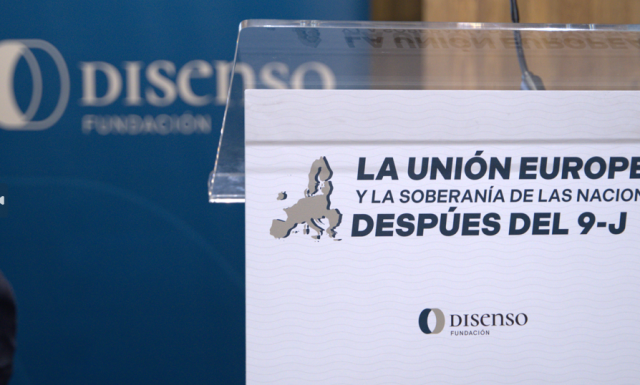
The Spain-based Fundación Disenso hosted a conference in Madrid this week about the results of the June 6 to 9 European Elections.
The conference took place in the margins of the meeting of the Working Group of European Conservatives.
The title of the conference was “The European Union and the sovereignty of nations after June 9.”
Fundación Disenso, the influential think tank of the Conservative VOX party (ECR), gathered a top-tier line up to discuss not only the positive results of European conservatives, but also the collusion between the European People’s Party (EPP) and the Socialist & Democrats (S&D).
Eduardo Cader, the Director of Disenso’s international division hosted the event. The panel was moderated by Vajk Farkas, the director of the recently opened Madrid office of Hungary’s Centre of Fundamental Rights.
Also joining the panel were José Antonio Fuster, VOX’s national speaker; Enikő Győri, MEP and former Hungarian Ambassador to Spain; and Alvino-Mario Fantini, the U.S. editor of The European Conservative.
The panelists agreed that the EPP, the liberals, and the S&D have left the will of European voters unacknowledged, given the renewal of their pact against patriotic Conservative forces, which saw an important surge after the June elections.
They also encouraged Conservative forces in Parliament and across Member States to work together to develop an agenda, not only at the political level, but within the realm of culture, so that the ideas they defend may permeate society and promote the values of liberty and democracy that served as the bedrock of the European Union and Western civilization in general.
The panelists delved deeply into some of the issues that must be faced by European authorities this term. According to Alvino Mario Fantini, “illegal immigration is Europe’s main problem, more than the economy”. He added that in order to tackle this and other issues, “we need to bring the right wing together”, a wink at the alleged tensions between European Conservative forces.
As for the dealings between liberals, the EPP and the Socialists, Enikő Győri added that “they pretend to change nothing.” However, she reminded the audience that Hungary will imminently be assuming the six-moth rotating presidency of the Council and will push for “a Europe of common sense.”
“Make Europe great again” is the slogan Hungarian authorities chose for their Council presidency, which is set to become a bulwark against the programme of Ursula Von der Leyen and her Socialists and liberal coalition partners.
José Antonio Fuster highlighted the “hypocrisy” of so-called centre right forces, such as the Partido Popular of Spain, which is part of the EPP. According to Fuster, “the Partido Popular has a strong inclination toward the centre left.”
He added that “they will work to maintain the status quo.”
Another interesting dimension to the panel came from the analysis of Disenso’s own Eduardo Cader. He spoke about the Union’s foreign policy and how it has aided and legitimized dictatorial regimes in Latin America. Cader said in this regard that “today the European Union has drifted from what its founding father proposed”.
This event closed a cycle of conferences Disenso has hosted to discuss the political, social, and cultural context around the European elections. The think tank launched this cycle in April with a conference about “The future of Europe” in tandem with The Heritage Foundation from the United States.
The meeting of the Working Group of European Conservatives, which took place in Madrid on June 27 and 28, was attended by the Warsaw Institute of Poland, The European Conservative and the Danube Institute from Hungary, Nazione Futura of Italy, Oikos Institute from Sweden, Fundación Disenso from Spain, and the think tank New Direction.



 Subscribe
Subscribe